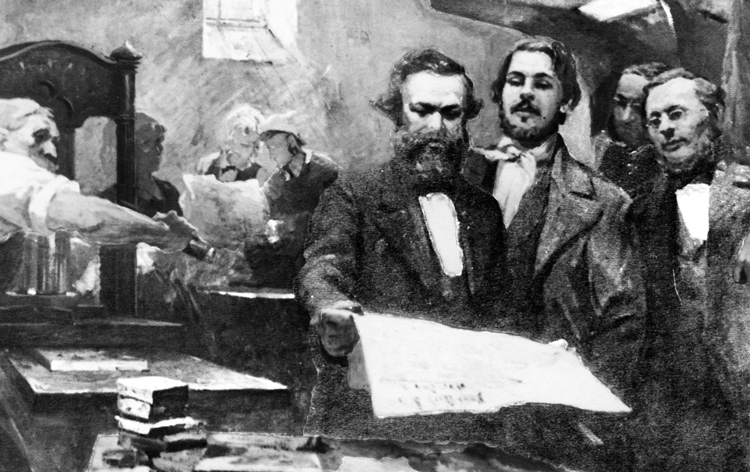The excerpt below is from one of Pathfinder’s Books of the Month for June, Socialism: Utopian and Scientific by Frederick Engels. Engels helped found the modern communist movement alongside Karl Marx. In this book, written by Engels with the collaboration of Marx in the 1870s, he explains how utopian socialism arose in the early 19th century as a response to the horrors of the development of capitalism. Engels explains how socialism was put on a scientific foundation as the theoretical expression of the working-class movement in its revolutionary struggle to overturn capitalist rule and conquer state power. Copyright © 1989 by Pathfinder Press. Reprinted by permission.
BY FREDERICK ENGELS
Modern socialism is, in its essence, the direct product of the recognition, on the one hand, of the class antagonisms existing in the society of today between proprietors and nonproprietors, between capitalists and wageworkers; on the other hand, of the anarchy existing in production. But in its theoretical form, modern socialism originally appears ostensibly as a more logical extension of the principles laid down by the great French philosophers of the eighteenth century. Like every new theory, modern socialism had at first to connect itself with the intellectual stock-in-trade ready at hand, however deeply its roots lay in material economic facts. …
We know today that this kingdom of reason was nothing more than the idealized kingdom of the bourgeoisie; that this eternal right found its realization in bourgeois justice; that this equality reduced itself to bourgeois equality before the law; that bourgeois property was proclaimed as one of the essential rights of man; and that the government of reason, the contrat social of Rousseau, came into being, and could only come into being, as a democratic bourgeois republic. The great thinkers of the eighteenth century could no more than their predecessors go beyond the limits imposed upon them by their epoch. …
While, however, the revolution in the conception of nature could only be made in proportion to the corresponding positive materials furnished by research, already much earlier certain historical facts had occurred which led to a decisive change in the conception of history. In 1831 the first working-class rising took place in Lyons; between 1838 and 1842 the first national working-class movement, that of the English Chartists, reached its height. The class struggle between the proletariat and bourgeoisie came to the front in the history of the most advanced countries in Europe, in proportion to the development, upon the one hand, of modern industry, upon the other, of the newly acquired political supremacy of the bourgeoisie. Facts more and more strenuously gave the lie to the teachings of bourgeois economy as to the identity of the interests of capital and labor, as in the universal harmony and universal prosperity that would be the consequence of unbridled competition. All these things could no longer be ignored, any more than the French and English socialism, which was their theoretical, though very imperfect, expression. But the old idealist conception of history, which was not yet dislodged, knew nothing of class struggles based upon economic interests, knew nothing of economic interests; production and all economic relations appeared in it only as incidental, subordinate elements in the “history of civilization.”
The new facts made imperative a new examination of all past history. Then it was seen that all past history, with the exception of its primitive stages, was the history of class struggles; that these warring classes of society are always the products of the modes of production and of exchange — in a word, of the economic conditions of their time; that the economic structure of society always furnishes the real basis, starting from which we can alone work out the ultimate explanation of the whole superstructure of juridical and political institutions as well as of the religious, philosophical, and other ideas of a given historical period. … [N]ow a materialistic treatment of history was propounded, and a method found of explaining man’s “knowing” by his “being,” instead of, as heretofore, his “being” by his “knowing.”
From that time forward, socialism was no longer an accidental discovery of this or that ingenious brain, but the necessary outcome of the struggle between two historically developed classes — the proletariat and the bourgeoisie. Its task was no longer to manufacture a system of society as perfect as possible, but to examine the historico-economic succession of events from which these classes and their antagonism had of necessity sprung, and to discover in the economic conditions thus created the means of ending the conflict. But the socialism of earlier days was as incompatible with this materialistic conception as the conception of nature of the French materialists was with dialectics and modern natural science. The socialism of earlier days certainly criticized the existing capitalistic mode of production and its consequences. But it could not explain them and therefore could not get the mastery of them. It could only simply reject them as bad. The more strongly this earlier socialism denounced the exploitation of the working class, inevitable under capitalism, the less able was it clearly to show in what this exploitation consisted and how it arose. But for this it was necessary (1) to present the capitalistic method of production in its historical connection and its inevitableness during a particular historical period and therefore, also, to present its inevitable downfall; and (2) to lay bare its essential character, which was still a secret. This was done by the discovery of surplus value. It was shown that the appropriation of unpaid labor is the basis of the capitalist mode of production and of the exploitation of the worker that occurs under it; that even if the capitalist buys the labor power of his laborer at its full value as a commodity on the market, he yet extracts more value from it than he paid for; and that in the ultimate analysis this surplus value forms those sums of value from which are heaped up the constantly increasing masses of capital in the hands of the possessing classes. The genesis of capitalist production and the production of capital were both explained.
These two great discoveries, the materialistic conception of history and the revelation of the secret of capitalistic production through surplus value, we owe to Marx. With these discoveries socialism became a science.


